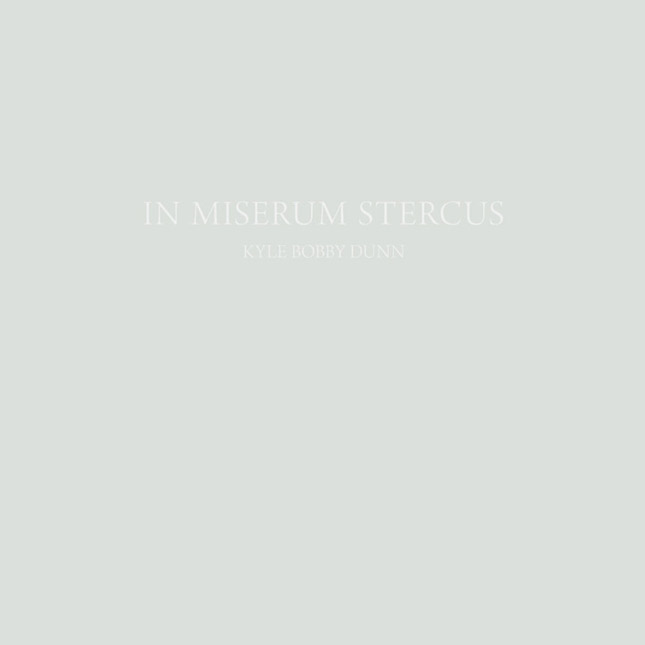After the mammoth two-hour Bring Me The Head of Kyle Bobby Dunn from earlier this year, one might be inclined to think Kyle Bobby Dunn was dosing up his fans and listeners for some time to come. Two hours of ambient music can tide you over for a long time. Even now, months after I first heard Dunn’s last album, I’m still finding new nuances and moments that I swear weren’t there before. The joy of ambient music comes in being able to lose yourself in it, but it’s wonderful when you can be surprised by something you thought you knew the slows contours of.
Thus, still reeling of Bring Me The Head, Dunn’s new album, In Miserum Stercus, might seem like something of an exhaustive prospect to add to his rapidly growing catalogue. However, it turns out to be something of a refreshment. At just over half an hour in length, Stercus feels like a palette cleanser as much as it does another noteworthy addition to his list of releases. With some songs culled from the same recording sessions as Bring Me The Head, there’s an inherent similarity between the two, but it soon slips away. Opening track “Buncington Revisited” is one of Dunn’s more sombre pieces, cast in a dark hue and almost foreboding in sound. The track introduces itself in a manner that seems sudden, with a sweep of noise that soon settles. Over its thirteen-minute runtime it sways in and out of focus, and in the middle all the noise seems to fade away, leaving a memorable moment of quiet introspection where nothing but (what sounds like) a slowed down microphone hiss plays. It’s like staring into blank space, thinking of nothing.
Following track “Lake Wapta Rise” is another cut of downtrodden drones that seeps into focus like the early darkness of winter, sucking away the light of day in a way that’s unnoticeable until it has happened. The title is noteworthy, too; it shares what sounds like a place name with the previous track and other quondam releases. Whether or not they are real or fictional locations could be answered by simply entering the names into a search engine, but it seems counter the point to do so. Part of the appeal of Dunn’s music is about how it can transport you to a new place, like Tim Hecker does on his more brazen releases, specifically on his 2009 album An Imaginary Country. These tracks might be Dunn’s own way of reminiscing on places he’s visited or has lived and grown up in the past, and with certain names (“Completia Terrace,” “Buncington”) it sounds like he’s changed the names to mask their identity, like a famous author might do to the names of those s/he grew up with in their autobiography. The music might invite you to make your own fantasy world, but at the same time it feels like Dunn’s own.
Stercus moves away from the growing shadows and brightens up during its second half, if not also allowing itself to open up, too. “Meadowfuck” (Dunn’s tongue-in-cheek humour shines through, as always) moves about like long grass in the wind, clouds above occasionally blocking out the sunlight. It sounds similar to the more active moments from his 2011 album Ways of Meaning, chiming like muted, muffled bells. Between “Meadowfuck” and the two previously mentioned tracks is “In Praise Of Tears,” which acts as the transition point between the album’s two sides. It’s a peaceful five minutes akin to one of the more undisturbed tracks from Hammock’s 2006 album Maybe They Will Sing For Us Tomorrow. During some listens it drifts by quickly, but during others it lingers for just the right amount of time, allowing you to soak up its quietly dewy tones.
If Stercus is a palette cleanser, then it comes to a close on an ambiguous note. Trailing off from “Meadowfuck,” “The Milksop” runs at just under three minutes and seems to put the listener back in that space that feels like the musical equivalent of limbo. Tones that sound like previous moments slowed-down more and reversed are repeated every so often, like a quiet purge. It’s no new thing for an artist to want to move on from dark, depressed portions of their life, and even though Dunn offers plenty of daylight to beat the night-time here, he sounds like he might be hurrying the end. If he’s not careful he might end up back in a dark spot, but from the listener’s perspective that’s not a bad thing really when you’ve got Stercus playing.

